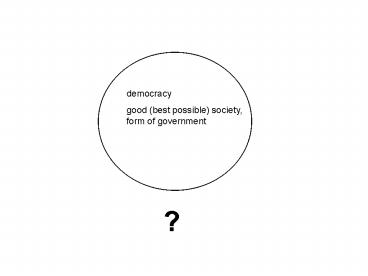democracy PowerPoint PPT Presentation
1 / 18
Title: democracy
1
democracy good (best possible) society, form of
government
?
2
set of good things, values
democracy
?
3
since the nature of a state (polis) is to be a
plurality, and in tending to greater unity, from
being a state, it becomes a family (oikos,
household), and from being a family, an
individual for the family may be said to be more
one than the state, and the individual than the
family. So that we ought not to attain this
greatest unity even if we could, for it would be
the destruction of the state. Again a state is
not made up only of so many men, but of different
kinds of men for similars do not constitute a
state. It is not like a military alliance
Aristotle, The Politics Book II.2, 1261a
4
oligarchy has in view the interest of the
wealthy democracy of the needy none of them the
common good of all oligarchy is when the men of
property have the government in their hands
democracy, the opposite, when the indigent, and
not the men of property, are the rulers the
real difference between democracy and oligarchy
is poverty and wealth Aristotle, The Politics
III8
5
the wealthy, aristos (wealth, usually a minority)
aristocracy,oligarchy
the virtuous, the good (reason)
the many, not the wealthy, demos (non-wealthy,
number, usually a majority)
democracy
women, slaves, non-citizens, foreigners
(non-citizens)
6
the wealthy, aristos (wealth, usually a minority)
politeia, citizens state, civic state,
republic rule for the sake of the common good
the virtuous, the good (reason)
the many, not the wealthy, demos (non-wealthy,
number, usually a majority)
women, slaves, non-citizens, foreigners
(non-citizens)
7
Aristotle democracy vs. good
society (rule of the demos) vs. (politeia, for
the common good) contemporary democracy
and good society (power of the people)
and (other crucial values)
8
set of good things, values
democracy
?
9
- Problems with democracy
- rule of the many
majoritarian rule, tyranny of the majority status
of minority, minorities
rule by number not reason
10
- Problems with democracy
- rule of the many
- tyranny of the majority
- rule by number, not reason
- rule of the people
the (fluctuating) will of the people not reason
develops into rule of the rhetorically skilful,
influential citizens, the strong rule of the
people is an illusion!
11
- Problems with democracy
- rule of the many
- - tyranny of the majority
- - rule by number, not reason
- rule of the people
- - the will of the people, not reason
- - rhetorical skill, influence, the strong
factionalism, conflicts between groups continuous
power struggle
12
democracy
- power of the people as moral ideal
- freedom
- equality
- participation, influence
as well functioning system of government
ought to regulate
realistic limits on the ideal, functional demands
13
democracy
- power of the people as moral ideal
as well functioning system of government
- the problem of democratic legitimacy
- legitimate (right) transformation of ideal into
real mode of government, preserving the ideal in
a real mode of government - reconciliation of the contradictions between
ideal and reality (compromise)
14
- democracy (politics) as agon
- agon combat, struggle, conflict
- - in contrast with focus on good government and
the problem of democratic legitimacy
real democracy?
most important in democracy/for democratic
theory? - from what perspective?
15
- essence of democracy interpreted in terms of
action (not government) the real possibility of
the people to participate - plurality gt necessity of diversity and
conflicts - - between groups
- - between interests
- - between basic values
- analysis of the real site of democracy/major
site of democracy?
16
- democratization as a main issue, rather than
the rational justification of a mode of government
the people understood as what is always outside
of the power centre, empowerment contestation
of power as rule
17
problem of democratic legitimacy a project of
reconciliation democracy as agon not a project
of reconciliation, a project of contestation as
action question can/must democracy be both?
18
- democracy as polyarchy (Robert Dahl)
- democracy is a set of different issues internally
related with each other - participation
- institutional frameworks
- multiparty system
- administrative apparatus
- there is no primary site of democracy, nor is
democracy only a problem of democratic legitimacy?
proper division of the different problems

